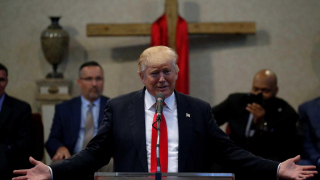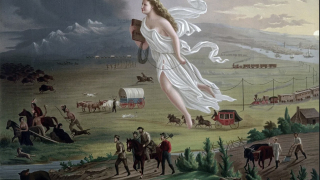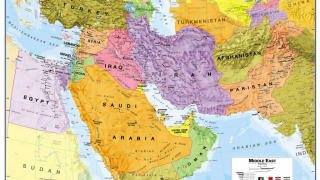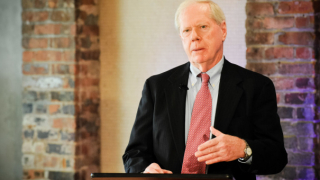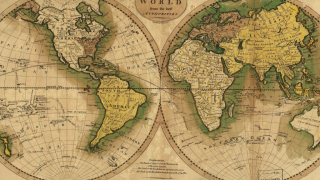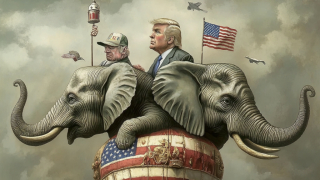Will the United States Remain a Republic?
Following the recent presidential election in the States, some have begun asking if the form of government will remain a republic. On this point, here at the South, Miss Karen Stokes offered the following:
‘In earlier, unpublished letters to another friend, Mann asserted that a republic was the best form of government ever given to mankind, declaring his undying devotion to that principle no matter what the cost. His beloved friend Jefferson Davis was of the same conviction, and in a well-known quote, predicted that this principle would “reassert itself, though it may be at another time and in another form.”
‘Current events may not bode well for Davis’s prediction, but we can still hope that he was right.’
Southerners are very enamored with the idea of a republic, but the time for childish fascination with that form of government must come to an end if better days are to be known in Dixieland and the rest of the Union. As we have mentioned before, the great defender of tradition in Spain in the 19th hundredyear, Count Juan Donoso Cortes, likened a republic to the halfway house between God-ordained monarchy and devil-inspired democracy. The republican phase of a people’s life is, as he put it, akin to the moment in the life of the Jewish people when they hesitated in their choice between Christ and Barabbas. Thus, a republic can only be a temporary form of government as eventually the folk must make a choice between one or the other.
On the surface, a republic appears to offer the safeguards and stability of a settled hierarchy, but by opening the doors, however slightly, to the notion that popular assent is always necessary for a government and its acts to be viewed as legitimate, the path to demonic democracy is embarked upon, and the journey will not end until every authority that impedes the fickle will of the people is removed. Ironically, it is a Massachusetts man (New Englanders are usually associated with political radicalism rather than with tradition), Mr Richard Henry Dana, Sr, who speaks so well to this. Prof Michael Connolly, summarizing some of his political thought, writes,
‘Enlightenment natural rights and the liberty of men to do as they please led to democratic self-government, a system Dana called “tyranny of the many.” If men were fallen creatures who needed the restraint of guiding institutions, democracy with its broadening franchise and frequent elections invited disaster. First, the “popular principle” of government led to worship of the self, a narcissistic democratic voter who believed himself the font of all decisions rather than leaders, institutions, and laws. Democratic government “must destroy reverence in the soul, and generate pride… There is reason to fear that the sensitiveness of a man, upon all that touches the republic, is too often nothing else than self, and that it is he, in feeling, who stands for the body politic.” Self-centered democratic man became as fickle and demanding as a customer at a store, insisting from government that which it cannot reasonably give. “So those who are impatient under settled and old authority are the most capricious masters, and the most unreasonable and overbearing in their demands.” Second, democratic citizens who esteemed themselves in a political system of constant change, rotating leadership, and impermanent laws lacked all respect for government. Incessant elections and political leaders who only served a few years drew little reverence; political disorder earned no obedience. The “hot haste of innovation” eroded all loyalty for anything greater than man himself.[8]’
Mr Dana has exposed the parentage of the modern republics and democracies: the principles of the Enlightenment – those principles which are the rejection of Christianity in favor of man-worship (although unfortunately he fails to mention what led to the Enlightenment itself: the theology of Roman Catholicism and Protestantism, together with the catastrophic 30 Years War (1618-48) between those two camps that scorched and scarred the soul of Western Europe, creating an Anfauglith there, a barren, empty wasteland devoid of Christianity, full of the throat-choking dust of unbelief in the Holy Trinity). The Gnostic, Neoplatonic plans of government ‘of the people, by the people, and for the people’ are not the true constitution of Christian Western Europe and her descendants here in the States. Sir Edmund Burke, one of England’s traditionalist statemen, put into words some of the parts of the true constitution of Western Europeans in his Letters on a Regicide Peace (Letter I, 1796):
‘The cause must be sought in the similitude throughout Europe of religion, laws, and manners. At bottom, these are all the same. The writers on public law have often called this aggregate of nations[80] a Commonwealth. They had reason. It is virtually one great state having the same basis of general law; with some diversity of provincial customs and local establishments. The nations of Europe have had the very same christian religion, agreeing in the fundamental parts, varying a little in the ceremonies and in the subordinate doctrines. The whole of the polity and oeconomy of every country in Europe has been derived from the same sources. It was drawn from the old Germanic or Gothic custumary; from the feudal institutions which must be considered as an emanation from that custumary; and the whole has been improved and digested into system and discipline by the Roman law. From hence arose the several orders, with or without a Monarch, which are called States, in every European country; the strong traces of which, where Monarchy predominated, were never wholly extinguished or merged in despotism. In the few places where Monarchy was cast off, the spirit of European Monarchy was still left. Those countries still continued countries of States; that is, of classes, orders, and distinctions, such as had before subsisted, or nearly so’ (Edmund Burke, Select Works of Edmund Burke. A New Imprint of the Payne Edition. Foreword and Biographical Note by Francis Canavan (Indianapolis: Liberty Fund, 1999). Vol. 3. 11/5/2020.).
This reverence for ancient customs and institutions is hardly the stuff of modern American governance. Truly, many in the States think they have improved upon old forms of government by putting nearly all officials up for a vote. They think they will get better governors because they get to make a choice based on the outward characteristics of the men presented to them, but they are mistaken, Dr Vladimir Moss says:
‘The hereditary principle is deemed irrational by people of a democratic mentality (which means almost all people in today’s world) because they have no control over it. In a democratic election, the ruler is chosen – theoretically, at any rate - for his personal qualities and experience that makes him capable, in the judgement of the people, of wielding executive power. Thus democracy is based – again, theoretically – on meritocracy, on the eminently rational basis that this man is the best qualified for the job. But a religious people thinks quite differently. They think and feel that they are not capable of choosing who is best for the job. They believe that only God can know that. And so they try as hard as they can to take the choice out of their own, merely human hands and into the hands of God alone. They welcome the supposedly “chance” nature of hereditary election; for it places the election out of their control and therefore in the control of God alone.’
An Orthodox Christian people will not, therefore, chase after republican or democratic forms of government, but rather the hereditary, the monarchical. Having emptied themselves of their Enlightenment pride, they will be able to accept God’s rule over them through His anointed king, rather than striving against God by pursuing and idolizing their own fallen passions:
‘A common misapprehension concerning Orthodox Autocracy is that it is unlimited, absolutist, despotic. Although some Orthodox kings and emperors have behaved at times like despots, these were aberrations, exceptions to the rule. Ivan the Terrible, for example, behaved like an exemplary Orthodox autocrat in the first half of his reign, and declined into absolutism in the second half. A true Orthodox autocrat feels bound by the Orthodox ideal that is preached by the Church, and defers in all spiritual matters to the Orthodox Church. This is what is meant by the “symphony” between the Church and the Autocracy that was first proclaimed by the Byzantine Emperor Justinian, who in his Novella 131 decreed: “The Church canons have the same force in the State as the State laws: what is permitted or forbidden by the former is permitted or forbidden by the latter. Therefore crimes against the former cannot be tolerated in the State according to State legislation.” Even the less distinguished autocrats decreed laws supporting the dogmas and canons of the Church – for example, about attending church on Sundays and feasts, and about the non-participation of the clergy in politics and the army. The autocrat is not limited by the people, by purely human norms and customs. But he bows before the Law of God, and orders his people to do the same. “The power of the tsar,” says St. John of Kronstadt, “is autocratic, for he does not receive it from the people, and for that reason it cannot be limited by the people and be responsible to it. Since the tsar’s power proceeds from God it is responsible only before Him and can be limited only by the will of God Himself and His holy laws, to which it must be strictly conformed, without deviating from them (Ibid.).”’
Will the Southern States, or the Union as a whole, remain republics? That is not the fundamental question.
Should they remain republics? That is what they ought to be asking themselves if they really consider themselves to be a Christian people. Hopefully, all the fraud and other rigmarole surrounding the 2020 presidential election will make them dwell on that question.



